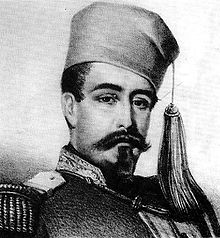Louis Juchault de Lamoricière
Christophe-Léon-Louis Juchault de Lamoricière or La Moricière (born September 5, 1806 in Saint-Philbert-de-Grand-Lieu near Nantes , † September 11, 1865 in Prouzel near Amiens ) was a French general and statesman. He played an important role in the conquest of Algeria and was Minister of War of the Second Republic for a few months in 1848 .
Life
After attending the Ecole du Génie in Metz since 1826 , he joined the pioneer group in 1828 . In 1830 he was sent to Algeria as captain of the Zouaves , where he rose steadily in the following years. In 1837 he became a colonel, in 1840 general and governor of the province of Oran and in 1843 lieutenant general. He was one of the best generals of Bugeaud , distinguished himself on August 14, 1844 at Isly and in 1845 represented the absent Bugeaud as governor general. In 1847 he finally accepted the surrender of Abd el-Kader .
Alexis de Tocqueville , a staunch colonialist and an expert on Algeria in his parliamentary career, considers Lamoricière to be the most important officer in the conquest of Algeria in his work " Thoughts on Algeria " in 1841 :
“This man has very big weaknesses and even very big mistakes, which in my opinion consist in an unrestrained and excessive ambition, extreme disregard for human life and a relentless and unapproachable personality. But he knows the country very well, has an iron will and an indestructible energy. His ideas are bizarre and imperfect, but in some ways very far-reaching. He loves Africa, sees it as his country and identifies with it. (...) I think you have to try with Lamoricière at the top. But he is a person who has to be monitored now and in the future. "
This ambivalent characteristic makes it clear that Tocqueville Lamoricière only wants to see Lamoricière acting in Algeria, whereas he says not only with regard to him but also to all officers working there that God should save the French from “ ever having to experience France is controlled by an officer of the Africa Army! “As for the situation in Algeria in 1846, Tocqueville wrote to Lamoricière on April 5, 1846:
"From the moment we committed the great act of violence of conquest, I believe we must not shrink from the detailed acts of violence that are absolutely necessary to consolidate the conquest."
After his return to France, Lamoricière played an important role as a military and deputy (since 1846) in the February Revolution of 1848 . As Commander in Chief of the National Guard, he commanded the attack on the barricades. He served the Cavaignac government as Minister of War from June 28 to December 20. From 1850 to 1851 he was on a diplomatic mission in Russia.
Lamoricière was one of the most important opponents of the Prince-President Louis-Napoléon (later Napoléon III) and was therefore arrested and exiled during his coup on December 2, 1852. In 1857 he received permission to return to France, but refused the oath of allegiance to the emperor and instead took command of the papal troops against Piedmont in 1860 . On September 18, 1860, he was defeated by the Piedmontese army at the Battle of Castelfidardo .
He spent his last years in complete seclusion in France and died in 1865. In 1909 a statue was erected for him in Constantine , which has stood in his birthplace St Philbert since 1969. His tomb is in Nantes Cathedral .
literature
- Emile Keller: Le général de La Moricière: sa vie militaire, politique et religieuse . - Paris: J. Dumaine, 1874
Web links
Individual evidence
- ^ The Tocqueville specialist Jean-Louis Benoît in his work on p. 17 about Tocqueville.
- ↑ Harald Bluhm in the introduction to Alexis de Tocqueville: Small political writings , Akademie Verlag: Berlin 2006, p. 31.
- ↑ Alexis de Tocqueville: Small political writings , ed. by Harald Bluhm, Akademie Publisher: Berlin 2006, p. 128 f. (Note 31).
- ↑ Alexis de Tocqueville: Small political writings , ed. by Harald Bluhm, Akademie Verlag: Berlin 2006, p. 127. - As a member of the National Assembly, Tocqueville put these fears aside when the revolution of 1848 was put down and supports Cavaignac. (Cf. Olivier Le Cour Grandmaison , Coloniser. Exterminer. Sur la guerre et l'État colonial , Fayard: Paris 2005, p. 308.)
- ↑ Quoted in Domenico Losurdo , Freedom as a principle. A counter-history of liberalism , PapyRossa: Köln 2010, p. 303.
| predecessor | Office | successor |
|---|---|---|
| Louis-Eugène Cavaignac |
Minister of War of France June 28, 1848 - December 20, 1848 |
Joseph Marcelin Rulhières |
| personal data | |
|---|---|
| SURNAME | Lamoricière, Louis Juchault de |
| ALTERNATIVE NAMES | Lamoricière, Christophe-Léon-Louis Juchault de |
| BRIEF DESCRIPTION | French general and statesman |
| DATE OF BIRTH | September 5, 1806 |
| PLACE OF BIRTH | Saint-Philbert-de-Grand-Lieu near Nantes |
| DATE OF DEATH | September 11, 1865 |
| Place of death | Prouzel at Amiens |
